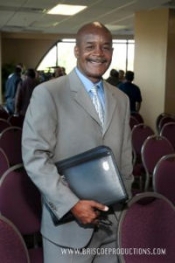
My Watergate Scandal Tell-All: How I Unwittingly Caused This Historic Event, by Bruce Givner (ExecuProv Press, Santa Ana, California, 2019, 258 pages.)
Book Review by Dennis Moore
“This is a story I’ll tell to my students many times. Internships can make history!”
- Larry J. Sabato, Director, UVA Center for Politics
November 8, 2019 (San Diego) - The Watergate story never dies. It has become more and more intriguing (and popular) as time goes by. It has evoked comment many a time when a Washington D.C. official becomes entangled in a self-styled web of deception. Watergate is no longer the name of a hotel and office complex. It is more than a proper noun that branded a piece of property and cemented its “title” in numerous pages of history books. It is now the go-to reference to identify any scandal, though its origin was first reserved for the most sordid political scandal our nation has ever witnessed – at least up until the writing of this book. In that respect, it ranks right up there in significance with Teapot Dome, Wounded Knee and Gettysburg.
 Bruce Givner, a tax attorney in Los Angeles, has written this provocative and insightful book; My Watergate Scandal Tell-All, at a time when the country is faced with a similar political scandal of epic proportions. The irony is that this riveting book is not lost on a scandal that has international implications, in which Russia has been identified as the culprit by every U.S. Intelligence agency as plotting to interfere in our 2016 presidential election, with President Trump being the primary beneficiary.
Bruce Givner, a tax attorney in Los Angeles, has written this provocative and insightful book; My Watergate Scandal Tell-All, at a time when the country is faced with a similar political scandal of epic proportions. The irony is that this riveting book is not lost on a scandal that has international implications, in which Russia has been identified as the culprit by every U.S. Intelligence agency as plotting to interfere in our 2016 presidential election, with President Trump being the primary beneficiary.
 Due credit for this book is given to Cherie Kerr, whom the author describes as his researcher and writing coach, and specifically states; “who pushed me through every chapter – coaxing me to dig deep into my memory to piece my story together, then helped me to organize it.” Cherie is pictured here.
Due credit for this book is given to Cherie Kerr, whom the author describes as his researcher and writing coach, and specifically states; “who pushed me through every chapter – coaxing me to dig deep into my memory to piece my story together, then helped me to organize it.” Cherie is pictured here.
Givner, an ordinary 21-year old student intern at the Democratic National Committee on June 16, 1972, paints a picture and story of capital intrigue that will go down in the annals of history as the benchmark of political corruption and malfeasance in government. He says in this book that he unwittingly caused this historic event. He stayed very late to make some free long-distance calls to friends and family – and in doing so held up the Watergate burglars intent on replacing defective eavesdropping equipment at the DNC.
When Givner finally left, the night watchman, Frank Wills, walked with him across the street to the Howard Johnson’s. The burglars saw their chance. But they made a tiny mistake. They taped a door open, which Wills discovered when he came back from seeing Givner off. The rest is history. Had Givner not stayed late to make those calls, Wills very probably would have not discovered the taped door and called the police. The burglars wouldn’t have been caught, and there would have been no Watergate scandal. And Richard Nixon might well have finished his second term as President.
 It is interesting to note that it was two policemen, John Barrett and Paul Leeper, who caught and arrested the burglars red-handed without firing a shot. The officers pictured here, looking like a couple of hippies, are Barrett (right) and Leeper (left) taken from Barrett's personal collection in front of the Watergate just hours after the arrests.
It is interesting to note that it was two policemen, John Barrett and Paul Leeper, who caught and arrested the burglars red-handed without firing a shot. The officers pictured here, looking like a couple of hippies, are Barrett (right) and Leeper (left) taken from Barrett's personal collection in front of the Watergate just hours after the arrests.
In a phone interview with the author, he lamented to me the ultimate fate of the late Frank Wills, indicating that he thought Wills deserved better in life for his role in the Watergate scandal.
Pertinent details in this riveting book and story that reads like a Robert Ludlum espionage novel, are as follows: “About that same time on Friday, four clumsy break-in crew members booked rooms at the Watergate – rooms 214 and 314. They arrived on the orders of G. Gordon Liddy, a former ex-FBI agent and campaign member on the Committee to Re-elect the President (CRP), and E. Howard Hunt, who served in that capacity as well.
After the break-in – and Nixon’s failure to modulate the stress it caused him – stories swirled of him drinking excessively; ranting at paintings on the walls; suffering bouts of total denial and extreme paranoia. In between came the hushed meetings with those he would eventually dump while trying to distance himself from the conspiracy and save his own ass, all according to the brilliant assessment and insight of Givner in his book My Watergate Scandal Tell-All.
Givner further states: “Over time, many reporters agreed with Nixon – that he didn’t know about the June 16 plot, the parties involved or the plan to ostensibly wiretap O’Brien’s office. In fact, it was finally proven that whether Nixon knew about it or not, he had not ordered the break-in. The orders came from John Mitchell, the former U.S. Attorney General to Nixon before he took on leadership of the Committee to Re-elect the President (CRP, though after the turmoil people referred to it as CREEP). Mitchell would go on to deny that, trying to pin it on Jeb Stuart Magruder, a Nixon Committee for the Re-Election of the President campaign manager, who later suggested it was White House counsel John Dean who ordered the coup.”
 In an article by Jim Shaw that ran in the Columbia Law School News, where Givner would receive his J.D. in 1976, dated February 24, 1975, Shaw gave an accurate account of the Watergate scandal, by stating: “But For Him, Nixon Might Still Be President.” It is also curious to me as to why the afore-mentioned Frank Wills would indicate to New York Times writer Sol Stern in 1974 that he “suspected Givner was likely part of the break-in team – and that he was the one burglar never caught.” When Givner read this, he thought: Frank, how could you? We were burger buddies! That comment by Frank Wills sparked further curiosity about Givner’s new nick-name: “Mystery Man”, with some reports going so far as to suggest Givner was a double agent – a Republican spy. Reading this well documented book would suggest otherwise. Pictured here is the actual desk and working area of the then 21-year old Givner.
In an article by Jim Shaw that ran in the Columbia Law School News, where Givner would receive his J.D. in 1976, dated February 24, 1975, Shaw gave an accurate account of the Watergate scandal, by stating: “But For Him, Nixon Might Still Be President.” It is also curious to me as to why the afore-mentioned Frank Wills would indicate to New York Times writer Sol Stern in 1974 that he “suspected Givner was likely part of the break-in team – and that he was the one burglar never caught.” When Givner read this, he thought: Frank, how could you? We were burger buddies! That comment by Frank Wills sparked further curiosity about Givner’s new nick-name: “Mystery Man”, with some reports going so far as to suggest Givner was a double agent – a Republican spy. Reading this well documented book would suggest otherwise. Pictured here is the actual desk and working area of the then 21-year old Givner.
The current impeachment inquiry of President Trump for “high crimes and misdemeanors” is being measured against the backdrop of Watergate, and what Givner reveals in this well written book.
The author provides a number of anecdotes throughout this book that provides insight into his upbringing and overall character, and provides background for his story, such as: “I was a reasonably normal, ordinary kid who grew up in a small Midwestern town living a rather non-descript, uneventful life. In fact, during my formative years in school, I paid little attention to politics – I was 10 years old when John F. Kennedy beat Richard Nixon – and had a ‘whatever’ attitude about it. Most of our neighbors were for Nixon (who carried the state of Ohio).”
 Another significant and poignant anecdote by Givner which seemed to shape his life and the writing of this book, is stated in this passage; “My grandfather Joe Givner emigrated to Lorain from Lomza, Poland in 1908, the same year the Ohio town celebrated the completion of the Nickel Plate Drawbridge across the Black River. It was the longest single-span structure in the world at the time. But it was not exactly welcoming for this Jewish immigrant, who found a sign on the beach that read: ‘No Jews Or Dogs Allowed.’ He chose to ignore it.”
Another significant and poignant anecdote by Givner which seemed to shape his life and the writing of this book, is stated in this passage; “My grandfather Joe Givner emigrated to Lorain from Lomza, Poland in 1908, the same year the Ohio town celebrated the completion of the Nickel Plate Drawbridge across the Black River. It was the longest single-span structure in the world at the time. But it was not exactly welcoming for this Jewish immigrant, who found a sign on the beach that read: ‘No Jews Or Dogs Allowed.’ He chose to ignore it.”
This book resonates with me for so many reasons, not the least of all the parallels of Watergate with our own and current Impeachment Inquiry of President Trump, but Givner’s relationship with his military veteran father who he saw his father’s health deteriorate over the years due to Multiple Sclerosis (MS).
 I saw my own father’s health deteriorate over the years, possibly due to Post Traumatic Stress Disorder (PTSD), and just as Givner’s family did, considered putting him in a V.A. nursing home. The author indicates that his father spent the last 12 years of his life in this V.A. nursing home on Sepulveda in California, and at one time questioning the author; “How could anyone move him out of his own home?” Fortunately for my own family, we did not have to subject our father to such an awful and painful decision, as my brother Ronnie stayed with and cared for him to his dying days. Givner admits in My Watergate Scandal Tell-All that it was an awful decision for him to have to make.
I saw my own father’s health deteriorate over the years, possibly due to Post Traumatic Stress Disorder (PTSD), and just as Givner’s family did, considered putting him in a V.A. nursing home. The author indicates that his father spent the last 12 years of his life in this V.A. nursing home on Sepulveda in California, and at one time questioning the author; “How could anyone move him out of his own home?” Fortunately for my own family, we did not have to subject our father to such an awful and painful decision, as my brother Ronnie stayed with and cared for him to his dying days. Givner admits in My Watergate Scandal Tell-All that it was an awful decision for him to have to make.
Also, and as a prelude to his Watergate episode, Givner shares another anecdote worth noting; While in the seventh grade he indicates he was saved from a serious mugging and beat down from three young boys by his buddy, Lemmie Davis, one of the only African Americans in school. Givner further stated: “Lemmie’s act of kindness demonstrated the overall alliance between Jewish and black populations in Lorain in those days.”
There are many parallels between what Givner has written and the ongoing and raging debate over the current impeachment inquiry of President Donald Trump. Notably, it involves an attack on the Democratic National Committee. In my earlier review of Donna Brazile’s book; Hacks, she indicates that in June 2016 the Washington Post first reported that Russian hackers had penetrated the Democratic National Committee.
 Ironically, and again, in Givner’s My Watergate Scandal Tell-All, he references Bob Woodward’s writing in the Washington Post of the burglarizing of the Democratic National Committee, and later the classic book by Woodward and Bernstein; All the President’s Men. Givner is pictured here with the policeman that caught and arrested the Watergate burglars.
Ironically, and again, in Givner’s My Watergate Scandal Tell-All, he references Bob Woodward’s writing in the Washington Post of the burglarizing of the Democratic National Committee, and later the classic book by Woodward and Bernstein; All the President’s Men. Givner is pictured here with the policeman that caught and arrested the Watergate burglars.
Another notable parallel and anecdote in this entertaining and insightful book, is how Givner describes the relationship between then President Nixon and Nixon’s Attorney General, John Mitchell. Givner states: “The Mitchell’s involvement with Watergate came to light through bizarre, headline-grabbing revelations from their living quarters there. Once sentenced, Mitchell declared the only fate worse than being jailed would have been a court order to continue to live with his wife, Martha, whom he apparently came to despise.” It makes one wonder if Trump’s current Attorney General William Barr will have a similar fate as Mitchell for his alleged cover up of crimes.
Perhaps it is an eerie coincidence that Givner references Roger Stone in his book My Watergate Scandal Tell-All by stating; “Roger Stone and investigative reporter Michael Colapietro also mentioned me in their book, Nixon’s Secrets: The Rise, Fall, and Untold Truth About the President, Watergate, And the Pardon. This highly speculative account suggests that the Watergate Special Prosecutor met secretly and repeatedly with Watergate trial judge John Sirica, in an effort to railroad Nixon and rig any appeal by him to a higher court.”
Givner follows this up by stating: “Stone’s credibility in all this is suspect at best and outright bankrupt at worst. He was not unlike Nixon’s cabal in that he described himself – in bragging tones, no less – as a Republican ‘dirty trickster.’”
To add further irony to this story, Givner states regarding Roger Stone: “In late January 2019, U.S. Special Prosecutor Robert S. Mueller indicted Stone on charges of lying to Congress, obstruction, and witness tampering connected to his communications with Wikileaks during the 2016 presidential election. In one now-famous photo, he is being led to court by a phalanx of armed Homeland Security guards while an angry protester thrusts a sign above Stone’s head that reads ‘DIRTY TRAITOR.’”
This book touches on so many things not related to Watergate, but serves as a reminder of our collective past, and where we need to go to assure the humanity and greatness of our country. This is truly a remarkable book, one that we can all learn from, especially considering our current political climate. Some insight into Nixon can be heard here.
 Dennis Moore has been the Associate Editor for the East County Magazine in San Diego and the book review editor for SDWriteway, an online newsletter for writers in San Diego that has partnered with the East County Magazine, along with having been a freelance contributor to EURweb based out of Los Angeles. Mr. Moore can be contacted at contractsagency@gmail.com or you can follow him on Twitter at: @DennisMoore8.
Dennis Moore has been the Associate Editor for the East County Magazine in San Diego and the book review editor for SDWriteway, an online newsletter for writers in San Diego that has partnered with the East County Magazine, along with having been a freelance contributor to EURweb based out of Los Angeles. Mr. Moore can be contacted at contractsagency@gmail.com or you can follow him on Twitter at: @DennisMoore8.







Comments
Watergate scandal
Charlie's Notes
Would yesterday’s Supreme Court ruling protected Trump??
The Supreme Court ruling in 1974 that had President Nixon resign due to the Watergate scandal, according to Chief Justice John Roberts, would have protected Nixon due to what Roberts' described as "official" acts! That decision in 1974 was by a unanimous 9-0 decision, which further indicates how decisive and political we have come since then. Nixon later said in a TV interview with David Frost that "when a president does it it is not illegal", which he would later retract it!
Trump throws Giuliani under the bus in bombshell interview
https://youtu.be/hPDf_jI9rsY
House Impeachment Report on President Trump
The attached House Impeachment Report makes a damning indictment of the President, which includes phone records of calls between Devin Nunes and one of the conspirators that have recently been indicted. See attached.
Phenomenal
My Watergate Scandal Tell-All:
Watergate Scandal Tell-All
Roger Stone Convicted on all 7 Counts
Roger Stone, who is referenced in Bruce Givner's brilliant book "My Watergate Scandal Tell-All", today was convicted on all 7 counts in federal court, which emanated from the Robert Mueller inquiry. In Givner's subject book, the aurhor states in regard to Watergate: "Stone's credibility in all this is suspect at best and outright bankrupt at worst. He was not unlike Nixon's cabal in that he described himself - in bragging tones, no less - as a 'dirty trickster'".
Stone behaved like a Mafia thug, sending a text to a witness
that read, "You are a rat. A stoolie. Prepare to die." He also encouraged the witness to like to Congress as a character in the Godfather II movie did to protect a Mafia boss. There is a lot of similarity between the Mafia and how this Trump administration is acting -- intimidating witnesses, stonewalling, breaking laws left and right. Stone is now the sixth Trump confidante who has been found guilty or pled guilty to serious crimes, and they all relate to his activities involving Russia.
Read more of the shocking details in our writeup here: read https://www.eastcountymagazine.org/roger-stone-found-guilty-death-threat...
Nice Review Dennis Moore
Power and the separation of it in the structure of our govt.
Watergate History Meets Trump Destiny
Dennis Moore's Review
FIRST PUBLIC IMPEACHMENT HEARING ECHOES WATERGATE
You are so very welcome Bruce, but as you say in your comment that you are not happy to see problems with President Trump that make people think of the problems with President Nixon, unforunately that is unavoidable. Just today in the impeachment hearing of President Trump another bombshell dropped, the fact that Gordon Sundland called the President on his cellphone from Ukraine, the very next day after that infamous phone call with the President of Ukraine and Trump allegedly make an incriminating statement that Sundland seemingly omitted from his earlier testimony before the Intelligence Committee. Bruce, a really great book and inside story on your part.
"My Watergate Scandal Tell-All"
Thank you Bruce, I just finished watching a movie titled "She Hate Me", in which the security guard Frank Wills that you referenced in your book, is cited in this movie, along with the burglars by name. It is a fascinating irony that just today I would be watching this movie that I had never seen or heard of, which compels me to go out and buy the DVD. It is also further reason why you might want to conider making a movie of your "My Watergate Scandal Tell-All".
"She Hate Me" movie referencing Watergate figures!
This brilliant book by Bruce Givner actually has a movie referencing Frank Wills, the security guard that discovered the Watergate burglars, which in the movie itself were called out by name. See image here.
“She Hates Me”
Listed on Amazon Prime for $2.99 to rent.
Watergate
Federal Judge rules that McGahn must testify to Congress
A federal judge ruled today that former White House Counsel Don McGahn must testify to Congress, despite President Trump's attempt to keep him from it. In Robert Mueller's report on the Trump Inquiry, it is alleged that there is/was an obstruction of justice. See judge's order here.
Another OBAMA activist judge who doesn't understand